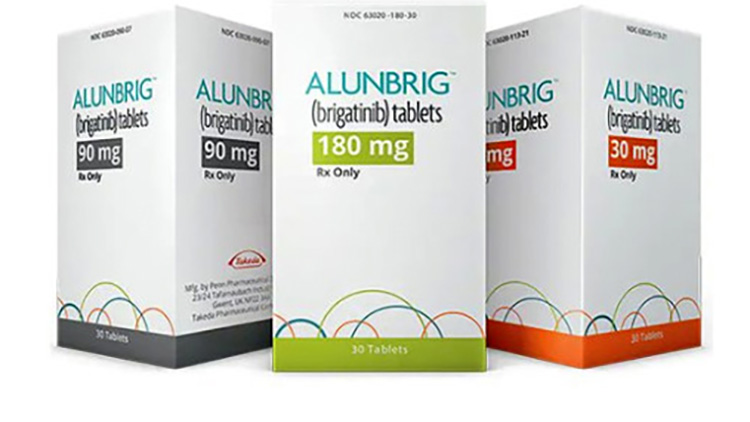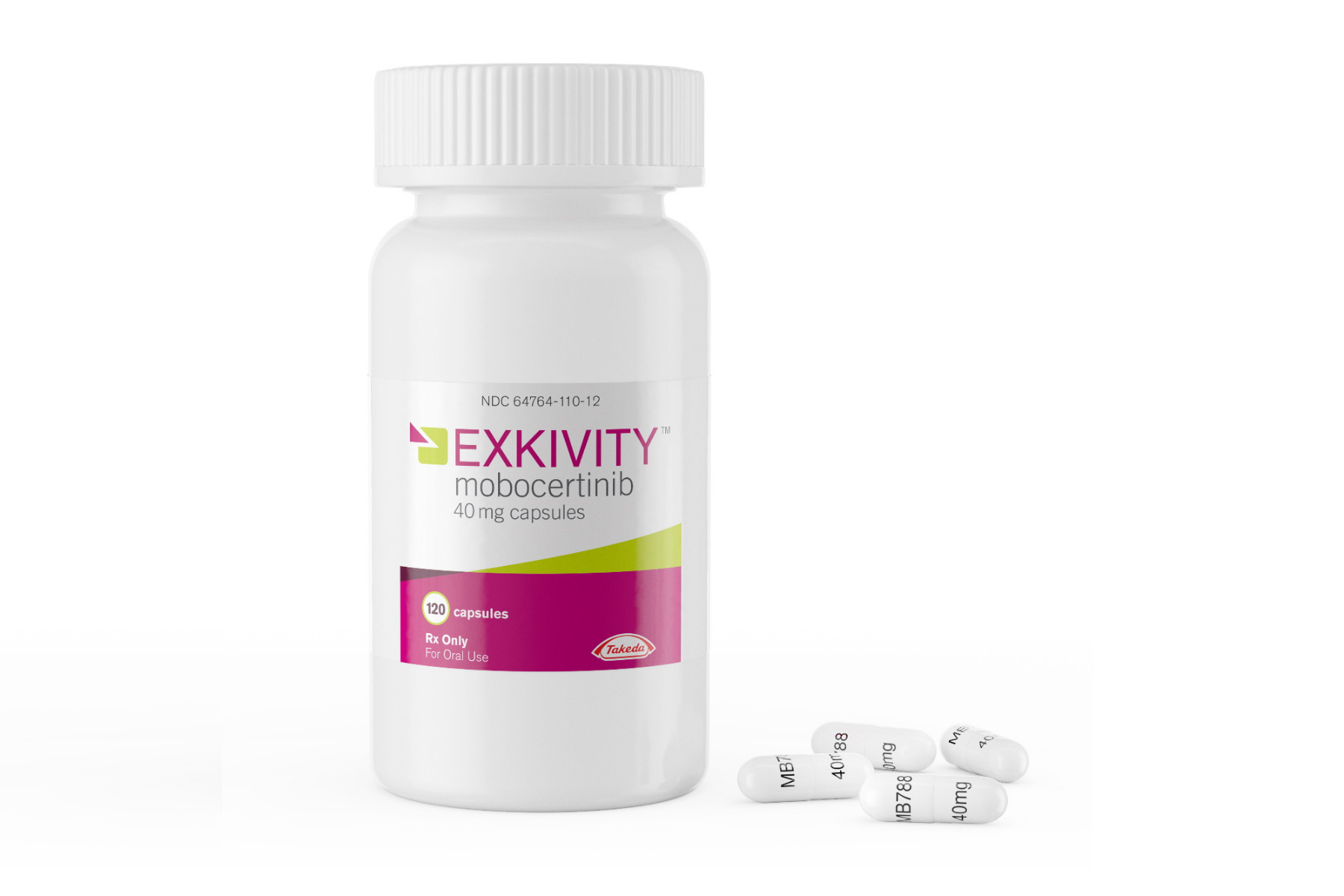Alunbrig (brigatinib) vs Exkivity (mobocertinib)
Alunbrig (brigatinib) vs Exkivity (mobocertinib)
Alunbrig (brigatinib) and Exkivity (mobocertinib) are both targeted therapies designed to treat non-small cell lung cancer (NSCLC) with specific genetic mutations. Alunbrig is approved for patients with NSCLC that is anaplastic lymphoma kinase-positive (ALK+) and can be used after crizotinib, another ALK inhibitor, has failed. Exkivity, on the other hand, is designed for patients with NSCLC harboring epidermal growth factor receptor (EGFR) exon 20 insertion mutations and is used when the disease has progressed on or after platinum-based chemotherapy. The choice between Alunbrig and Exkivity would depend on the specific genetic mutation present in the patient's cancer, as well as their previous treatments and overall health condition. It is crucial to undergo genetic testing to determine the presence of ALK or EGFR exon 20 insertion mutations and consult with a healthcare provider to assess the most appropriate treatment option.
Difference between Alunbrig and Exkivity
| Metric | Alunbrig (brigatinib) | Exkivity (mobocertinib) |
|---|---|---|
| Generic name | Brigatinib | Mobocertinib |
| Indications | Non-small cell lung cancer (NSCLC) with ALK mutations | Non-small cell lung cancer (NSCLC) with EGFR Exon20 insertion mutations |
| Mechanism of action | ALK inhibitor | EGFR kinase inhibitor |
| Brand names | Alunbrig | Exkivity |
| Administrative route | Oral | Oral |
| Side effects | Includes nausea, diarrhea, fatigue, cough, and hypertension | Includes diarrhea, rash, nausea, stomatitis, and vomiting |
| Contraindications | Hypersensitivity to brigatinib | Hypersensitivity to mobocertinib |
| Drug class | Anaplastic lymphoma kinase (ALK) inhibitor | Tyrosine kinase inhibitor |
| Manufacturer | Takeda Pharmaceuticals | Takeda Pharmaceuticals |
Efficacy
Alunbrig (brigatinib) Efficacy in Lung Cancer
Alunbrig (brigatinib) is a targeted therapy approved for the treatment of non-small cell lung cancer (NSCLC) with specific genetic alterations. It is particularly effective in patients with NSCLC that is anaplastic lymphoma kinase-positive (ALK+), which is a subgroup of lung cancer characterized by the presence of an abnormal ALK gene. Clinical trials have demonstrated that brigatinib is highly effective in patients who have progressed on or are intolerant to crizotinib, which is another ALK inhibitor. In these studies, brigatinib has shown a significant improvement in progression-free survival compared to chemotherapy and has been associated with high response rates in patients with ALK+ NSCLC.
Moreover, brigatinib has proven to be effective in treating patients with brain metastases, which is a common complication of advanced NSCLC. The intracranial response rate and duration of response in patients with measurable brain metastases have been particularly encouraging, making brigatinib a valuable option for this difficult-to-treat population. The efficacy of brigatinib after crizotinib failure suggests that it can be an important second-line treatment for patients with ALK+ NSCLC.
Exkivity (mobocertinib) Efficacy in Lung Cancer
Exkivity (mobocertinib) is another targeted therapy that has shown efficacy in the treatment of NSCLC, specifically in patients with tumors that have epidermal growth factor receptor (EGFR) exon 20 insertion mutations. These mutations are associated with resistance to many of the currently available EGFR inhibitors. As an oral therapy, mobocertinib has been granted accelerated approval based on the response rate and duration of response observed in clinical trials. Patients with EGFR exon 20 insertion-positive NSCLC who have been previously treated with platinum-based chemotherapy have experienced significant tumor shrinkage and prolonged periods of disease control with mobocertinib treatment.
The clinical development of mobocertinib is ongoing, with studies aiming to confirm the clinical benefit in a larger cohort of patients. However, the current data suggest that mobocertinib provides a much-needed treatment option for patients with EGFR exon 20 insertion-positive NSCLC, particularly after the failure of first-line chemotherapy. The drug's ability to target this specific mutation allows for a more personalized approach to lung cancer treatment, which can lead to better outcomes for patients with this genetic profile.
Regulatory Agency Approvals
Alunbrig
-
European Medical Agency (EMA), European Union

-
Food and Drug Administration (FDA), USA

-
Pharmaceuticals and Medical Devices Agency (PMDA), Japan

Exkivity
-
Food and Drug Administration (FDA), USA

Access Alunbrig or Exkivity today
If Alunbrig or Exkivity are not approved or available in your country (e.g. due to supply issues), you can access them via Everyone.org.
How it works

Make an enquiry
Choose the medicine you want to buy, answer a couple of questions, and upload your prescription to speed things up. We’ll get back to you within 24 hours.


Make an enquiry
Choose the medicine you want to buy, answer a couple of questions, and upload your prescription to speed things up. We’ll get back to you within 24 hours.


Breeze through the paperwork
We'll guide you through the required documents for importing unapproved medicine, ensuring you have all the necessary information.


Get a personalized quote
We’ll prepare a quote for you, including medicine costs and any shipping, administrative, or import fees that may apply.


Receive your medicine
Accept the quote and we’ll handle the rest - sourcing and safely delivering your medicine.

Some text on this page has been automatically generated. Speak to your physician before you start a new treatment or medication.
Let's talk
If you have any questions, call us or send us a message through WhatsApp or email:
Contact us




